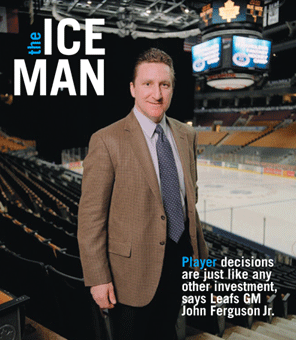THE
ICE MAN
Player
decisions are just like any
other investment, says Leafs
GM John Ferguson Jr.
 |
| Photography
by Kevin Kelly |
I lived
in Montreal till I
was about nine and my first
two years in school were all
in French. I have some recollections
of my father [former Montreal
Canadiens star John Ferguson,
Sr.] as a player, but not many
because I was only four when
he retired. I remember being
around the locker room and getting
Wrigley's chewing gum from the
trainer.
I
got to know the players
real well in Winnipeg when my
father was general manager of
the Jets. I was 11 when I got
there and used to practise with
guys like Laurie Boschman, Randy
Carlyle, Serge Savard, Dale
Hawerchuk and Thomas Steen,
whose son, Alexander, is a Leaf
rookie this year. I got extra
ice time after practices. It
was one of the special parts
of having a parent involved
in professional sports.
My
father always stressed
the importance of listening
to the coach, of being determined
and being competitive. He used
to say, "There are no friends
on the ice." He was helpful
in the fisticuffs department
as well. He would tell me, "Hit
first and keep swinging."
In
my senior year at Providence
College in Rhode Island, the
sportswriters of New England
voted me the most improved player
in Division I hockey in the
northeast. That got Montreal's
attention and they offered me
a contract.
In
pro hockey, I was a
two-way checking centre, never
scored more than 19 regular
season goals. I could have used
a little more ability to finish.
Most of the guys I played with
in the American Hockey League
won the Cup in Montreal in 1993.
There were a couple of years
when I felt I could play in
the NHL, but I never got that
chance.
I
applied to law school
in my fourth year in pro. I
had taken the LSAT (Law School
Admission Test) as an undergraduate
at Providence College and used
the same marks to get into law
school. In my third year, I
did an apprenticeship in the
legal department of the Rhode
Island Department of Corrections.
We defended correctional officers
in cases brought against them
by inmates.
I never
considered anything but hockey
as a career. I grew up around
the game. I saw it evolve both
on the ice and off. I was fortunate
to have great mentors: my father
and NHL executives like Larry
Pleau, Brian Burke and Lou Lamoriello.
If I'd gone into any other profession,
I'd have been forsaking 25 years'
experience.
When
I was in St. Louis,
I had the No. 2 job in the league
in terms of duties and responsibilities,
but after a while I knew I was
ready to become a manager. The
challenge in Toronto is to achieve
your goals on hockey's greatest
stage. That really inspires
and motivates me.
'You
have a finite sum...to
produce your yields every
year.
You've got to find value'
|
The
media coverage of the
Leafs is the type that most
teams can only dream of. It's
not always positive. It's our
job to ensure that we don't
let the media affect our decision-making
or how we prepare ourselves
to win.
The
player decisions I make
are the same as any investment
decision. You look at your roster.
You have a finite sum to commit
to players to produce your yields
every year. You've got to find
value. If you draft a junior
player, you have two years to
offer him a contract or you
lose your rights to him. With
a college player, you have four
years. We want a mix of assets
that are going to mature at
different periods. There are
always risks and potential rewards.
Winning
the Stanley Cup is
our No. 1 objective. We want
to bring a 12th championship
to Toronto. Our plan is to identify,
procure, develop and manage
our assets better than our competitors
over time and to compete consistently
for the Cup.
I
really think the NHL
has improved the game on the
ice and on television this year.
We've generated greater attack
speed through the neutral zone
by taking out the red line.
Players are being impeded less
off the rush and when they attack
the net. The game is more exciting
for the fans, but it's harder
to watch as a manager because
leads change hands. It's unpredictable.
We
get results in this
business every day. You just
have to open the newspaper to
see where you're at. It's demanding.
When I have time off, I spend
it at home with my wife and
my children. The schedule and
the hours are such that time
at home and time together are
cherished and, unfortunately,
rare. 
John Ferguson
Jr. became the 12th general
manager of the Toronto Maple
Leafs in 2003 and at age 38
is currently the youngest GM
in the National Hockey League.
He holds degrees in business
and law, has worked as a scout
and player agent, and came to
the Leafs from St. Louis, where
he was assistant general manager
for the Blues. He was interviewed
by D'Arcy Jenish.
|